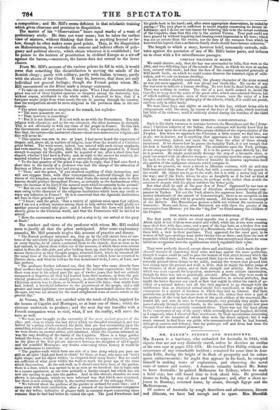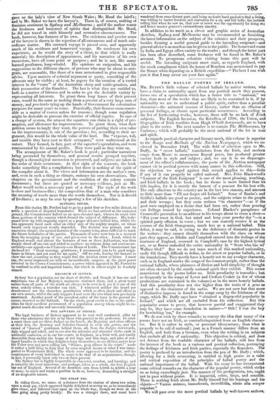MR. BAKER'S SYDNEY AND MELBOURNE.
MR. BAKER is a barrister, who embarked for Australia in 1841, with objects that are not very distinctly stated, unless he sketches an outline of his own case at pages 173-178. He reached Port Phillip without the occurrence of any remarkable incident ; remained for some time in Aus- tralia Felix, during the height of its flush of prosperity and its subse- quent embarrassment : for aught that appears in his book, he occupied himself in making tours of exploration, and observing the novel state of nature and society. A domestic calamity induced Mr. Baker to leave Australia : be quitted Melbourne for Sydney, where he made a brief stay, but still found time to look about him. He proceeded thence to India, by way of Java and Singapore ; and, after a short so- journ in Bombay, returned home, by steam, through Egypt and the Mediterranean.
Of notices of Australia by rough describers and adventurers, literate and illiterate, we have had enough and to spare. Mrs. Meredith
gave us the lady's view of New South Wales ; Mr. Hood the laird's; and in Mr. Baker we have the lawyer's. There is, of course, nothing of feminine sentiment in Sydney and Melbourne ; and if the author wants the freshness and buoyancy of spirits that distinguished Mr. Hood, he did not travel in such leisurely and recreative circumstances. The book, however, has features of its own. The strictness and precise sense of the lawyer is shown in the rejection of all extraneous and of much sub- ordinate matter. His outward voyage is passed over, and apparently much of his residence and homeward voyage. He condenses his own experience, as he would the story of a client, to that which is really material ; his description of appearances, and his narrative of his own excursions, have all some point or purpose ; and he is not, like many learned gentlemen, long-winded. His opinions on emigration, and his suggestions to the different classes of persons who may be about to emi- grate, are reasonable, like those of a man accustomed to give responsible advice. Upon matters of colonial argument or party, something of the advocate may be visible ; at least, he argues for the creation of a vested interest in the "runs" of the Australian sheep and cattle-graziers and their posssession of the franchise. The last is what they arc entitled to, both as a matter of fairness and in order to get the desirable variety by representing all interests. To grant them long leases of their present runs, would be the same as making them a present of a very large sum of money, and pro tanto tying up the hands of Government for colonization purposes for many years to come. Practically, their licences seem renew- able as a matter of course unless for reasons ; though some regulation might be desirable to prevent the exercise of official caprice. In case of a change of system, the utmost the squatters can claim is a right of pre- emption, and allowance for improvements. To grant them, what their petition seems to imply they want, the powers of putting their own value on the improvements, is out of the question ; for, according to their ar- gument, this would be the whole value of the land. The "expense, toil, and trouble they have cost to their occupants," were understood at the outset. They formed, in fact, part of the squatter's speculation, and were remunerated by his annual profits. They were paid as they went on. The arrangement of Mr. Baker's hook is good; particular narratives being presented by themselves, and general results grouped together, though a chronological MICCCSSiOn is preserved, and suluects are taken in the order of their occurrence. At first sight of the contents, the book looks something like a compilation; but there is nothing of the spirit of the compiler about it. The views and information are the author's own, and, even in such a thing as climate, embrace his own observations. The chapters on the government and the condition of the colony contain documents ; but these are quoted as necessary evidence, just as Mr. Baker would recite a necessary part of a deed. The style of the work is close and business-like ; the composition that of a man who considers the meaning of words more than the words themselves. Nor is it devoid of liveliness ; as may be seen by quoting a few of his sketches.
SETTLING TITLES.
From this station Mr. Powlett had to go to a point four or five miles distant, to settle a question of disputed boundaries. When we had arrived at the contested ground, the Commissioner halted on an open elevated spot, whence he could view those portions of the country which formed the subject of difference. His body- guard drew up with imposing aspect at a proper distance behind him, whilst the two opponents faced each other on either side of the mighty umpire, on whose breath such important results depended. The decision was prompt, and its execution simple; the natural features of the country being alone sufficient to mark the future boundaries of the parties. Thousands of acres were torn in a moment from the usurping grasp of one, and given over to the other. Land, which in England would cost almost the fortunes of two or three Ashburtons, was thus simply sliced off one run and added to another: no ruinous delay and anxious un- certainty—no appeal—no Chancery—no House of Lords. The Commissioner has declared it ! "Good morning, gentlemen; I recommend you to be good neigh- bours in future, and not send for me again." Off we rode, leaving the farmers to chew the cud, according as they might find the decision sweet or bitter. I must say, the scene impressed me with no inconsiderable surprise, at the great power invested in the Crown Commissioners a power which appeared in Mr. Powlett to be confined to able and impartial hands, but which in others might be fearfully abused.
DECORUM AT SYDNEY.
Sydney has a population not far short of 30,000; and though it has one and sometimes two of her Majesty's regiments stationed there, and a great many sailors from all parts of the world are always to be seen in it, yet it is one of the most orderly towns a traveller can visit. I witnessed neither the brawl nor drunkenness nor the shameless prostitution which so often shock and offend in our own streets, whilst the only beggars I met were the two blind men previously mentioned. Another proof of the prevalent order of the town is the general de- corum observed on the Sabbath. On the whole, great credit is due to the autho- rities for their excellent government of a population among whom might be ex- pected much disorder and unseemly immorality.
THE LAWYERS AT SYDNEY.
The legal business of Sydney appeared to be very well conducted, alike by those who administer the law as by those who practise in the profession. To enter a court there and see three Judges on the bench, the Registrar and other officers at their feet, the Attorney and Solicitor-General in their silk gowns, and the crowd of "learned" gentlemen behind them, all, from the Judges downwards, duly wigged and robed, and to see also the attornies and attornies' clerks sunk in admirable confusion, as in our law-courts in England, in a little well, and hardly discernible from amidst the heaps of red bags and blue bags, and piles of red- taped bundles in which they delight to bury themselves; to see all this, and to hear the Usher ever and anon calling out, "Silence, pray silence in the court !" made it rather a bold thing to deny that by some magical means or other I was trans- ported to Westminster HalL The whole scene appeared to be familiar, and the countenance of every individual in court to be that of an acquaintance, though, in fact, I personally knew only two or three present. The Sydney bar is highly respectable in character, number, and learning; and iii certainly the most numerous, and perhaps, taken as a whole, the best English bar out of England. Several of its members earn from 1,0001. to 3,000/. a year or more; to reach and retain a position to do so, however, demanding a struggle of no despicable nature.
THE STRAY PIG.
In riding there, we came, at a distance from the station of about two miles, upon a stray pig, which appeared highly delighted at seeing us, as he immediately gave chase, and followed close upon us the whole way, though we were at the time going along pretty briskly. Ile was a stranger there, and must have wandered from somedistant part; and being no doubt hard pushed tofind a living, was willing to barter freedom and starvation for a sty and full belly; his instinct telling him when he saw us, that now or never was the opportunity for doing so; and hence master grunter's extraordinary alacrity.
In addition to its merit as a clever and graphic series of Australian sketches, Sydney and Melbourne may be recommended as furnishing the latest information on the subject of the colonies and their prospects, besides forming a useful general guide to the intending emigrant—and general advice is as much as can be given to the public. The homeward route by India and Egypt offers variety to the reader ; and though the latter part has been often described, some freshness will be found in Mr. Baker's account. To prosperous colonists visiting home this part will be useful. The intending emigrant must start, as regards England, with
the stock compliment which the house of Bourbon was accustomed to pay the Stuart when departing on a British expedition—" The best I can wish
you is that I may never see your face again."



























 Previous page
Previous page